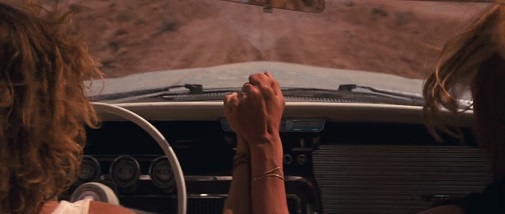 25th Anniversary Five-Part Mini Series Event
25th Anniversary Five-Part Mini Series Event
Pt 1 (Anne Marie & Margaret)
Pt 2 (Nick Davis)
Pt 3 (Daniel Crooke)
Pt 4 (Nathaniel R)
Pt 5 (Finale) by Laurence Barber
It feels awfully daunting to write about the ending of this film, and not just because, as Nathaniel pointed out, ditching the cop who pulled them over isn’t Thelma or Louise’s finest hour. As an Australian who has experienced outback heat, that scene always makes me feel a bit nauseous even if the way their doing away with this discipline daddy is pretty amusing. More logically, they could have made use of his handcuffs to disable him instead, but you have to appreciate that Callie Khouri hasn’t constructed these crimes around what feels like pattern behaviour. Aside from Thelma’s charm assault/armed robbery, their transgressions feel genuinely like two women thinking on their feet.
Also, you catch a glimpse of a shotgun behind him as he trades shades with Louise so I’ve always believed he figured his way out somewhere down the line (shoot the lock, dummy!).
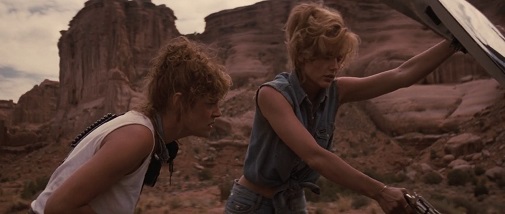
Thelma: Officer, I’m real sorry ‘bout this.”
Louise: I apologise also.”
1:40:00 This aspect of the scene has always spackled over my misgivings about it too. Much has been said and written in recent years about the way women over-apologise, exercising a kind of ingrained cultural deference to male authority. In this scene, however, their apologies become a subversion; the way Sarandon half-heartedly apologises tells us that she’s given up caring about the needs of men in any meaningful way.
Replete with her new Aviators – a hot new look Scott drinks in with a zoom that feels as awed by Sarandon as we do by this point – Louise and Thelma jump back in the Thunderbird and put rubber to the road, the final stage of their road trip stretching out before them. In a brief cut back to the police part of the plot, Harvey Keitel gravely intones, “Dreams will only get you so far, and luck always runs out.” Lighten up, toots...
1:41:03 Jeez, no matter what these ladies do they just can’t escape hypermasculine bullshit.
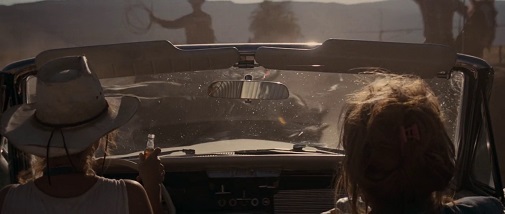
Louise, understandably, has yet another tiny bottle of booze in hand. Our two actresses are back in separate shots again as Louise ventures towards an apology for the mess she got them into, but Thelma reminds her that while what they’d done was bad, at least they had done it with agency. “They woulda made out like I’d asked for it. My life woulda been ruined a whole lot worse than it is now. At least now I’m having some fun.” Then she goes into this pose...
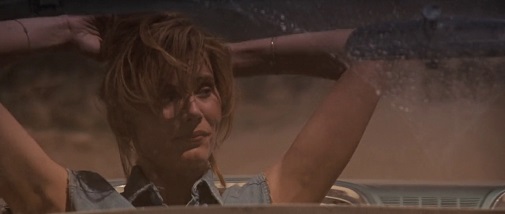
...which prompts a wonderful reaction from Louise:
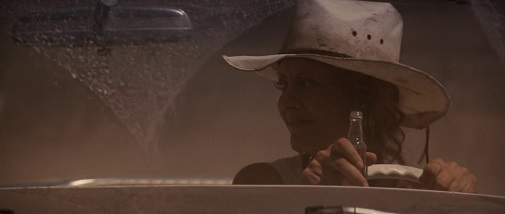 tfw you liberate ur crush from the heteropatriarchy
tfw you liberate ur crush from the heteropatriarchy
1:42:20 Here comes one of my very favourite scenes as Louise calls to talk to Slocumb. This is the scene which should have nabbed Keitel an Oscar nom that year. His gentle concern and fondness for Louise is so disarming when in anything other than a masterpiece he’d be some kind of alpha male Javert type trying to take them down by all means necessary. Yet another phone conversation rendered stunning by framing and performance as Thelma reacts to the conversation wordlessly in the background.
And then Slocumb mentions Texas and it’s like the final straw.
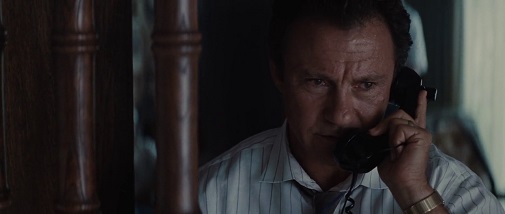
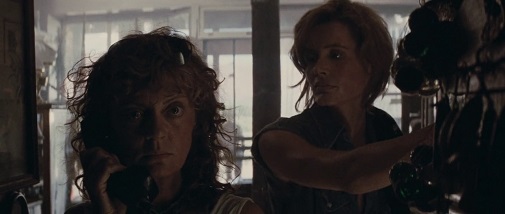
1:45:30 It’s wonderful how every time Thelma and Louise talk candidly about their predicament it becomes even more nuanced than before. Louise declares that she has nothing to go back for – “Jimmy’s not an option” – and Thelma decides, “Something’s like…crossed over in me and I can’t go back.” For those of us, myself included, who consider this at least fractionally a queer story, this is where it truly happens. Look at the way Davis steels herself for this admission:
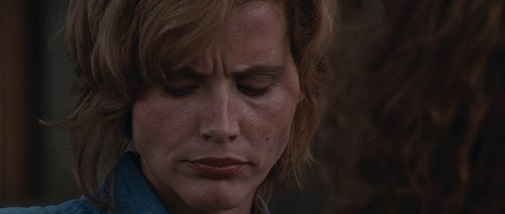
Louise then drops the news that they’re being charged with murder, and Thelma responds, “Ooh!” How wonderful is this movie? Thelma says she “feels awake”, and they chat about the future they know they don’t truly have in Mexico. You can read in their faces that they know what’s in store.
1:47:40 The old world…into the new.
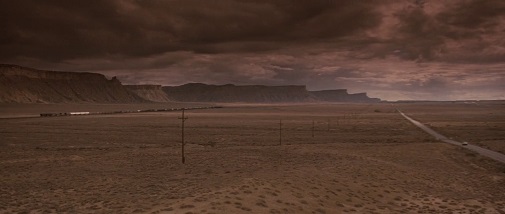
Another quick song break – “Better Not Look Down” by B.B. King – and the soundtrack continues its less-than-subtle streak.
Then, up ahead, looms the truck driver.
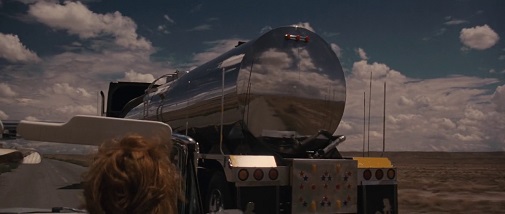
If Thelma & Louise were made in 2016, this guy would probably be a men’s rights activist. Instead he’s a coke dealer-looking nutjob who pulls off his wedding ring and kisses his condoms for, I guess, good luck. Is this wishing for good sex or intact prophylactics? So much unexplored psychology. He is garishly awful, even doing a quick jig when he jumps down from his rig. Even if these broader moments don’t work as well for you, you can’t say Scott and Biddle didn’t know how to shoot them.
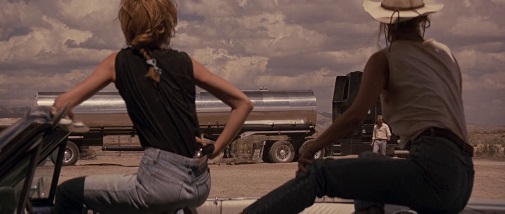
It’s full circle by this point. These avenging Charlie’s Angel poses are glorious, although I’m not sure how much I dig Thelma’s costume change. But then, given her newfound disposition and freedom, it seems fairly ironic to wear a Confederate flag.
1:51:53 Attention to detail: Thelma’s arm is still bruised.
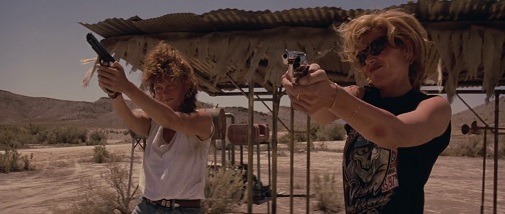
1:52:55 We quickly revisit the cop in the car to make sure he’s still alive, I guess. Unfortunately for him, the person who finds him turns out to be a cyclist smoking a big ol’ blunt. Not that the racial implications weren’t clear at the time, but this brief scene feels a bit less funny these days than it used to. We also briefly see Christopher McDonald looking anguished as we hear police radio list off Thelma and Louise’s crimes. It’s quite a list.
1:55:00 The first sighting of police cars. Louise asks, “Think that’s all?” Thelma replies, “I dunno, I don’t think so.” Good instinct. They veer off the road and the police cars follow; the famous chase begins. I had forgotten that they have to drive straight through a bunch of police cars. One flips, another slams into two others, and the Thunderbird knocks a side mirror off yet another as it soars gracefully in slow-motion.
A brief digression so I don’t just describe the entire car chase: my first introduction to Thelma & Louise was via The Simpsons’ episode “Marge on the Lam”, in which Marge and Ruth Powers go on an extended jaunt to escape the men in their lives.

It’s a great episode, and one of the uncommon Simpsons episodes that focuses purely on female friendship (at least in part because Lisa and Marge aren't exactly social butterflies). It’s also smart enough not to treat Thelma & Louise, timeless as it is, as a sacred cow. At one point Homer bemoans the fact that it seems like Marge and Ruth are going to drive into a massive chasm just to teach men a lesson. It’s a loving but needling homage.
1:57:35 This film does absolute wonders with these aerial shots, and this iconic image is no exception. It's strangely appealing that once the cars travel through the shot far enough it becomes harder to differentiate between the Thunderbird and the police cars. We’re all just human beings, man.

1:58:25 Here’s a cruel scene because for a second it feels like maybe that was the worst of it. A police car blocks the way after their convertible squeezes under a rail bridge and as they drive on they sit in silence and take stock.
“You’re a good friend.”
“You too, sweetie. The best.”
The relative calm is punctured when Zimmer’s score kicks in and the helicopter emerges, almost like a particularly annoying mosquito. You know it’s going to draw blood no matter how hard you try to squash it at this point.
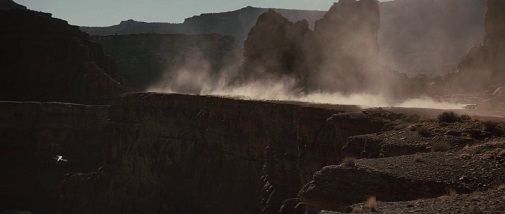
2:00:25 It’s really difficult to keep track of the geography at this point. You can sort of tell that they’re essentially driving where there are beautiful shots to be found. The cavalry arrives, and the Grand Canyon stretches out below them. They only get to appreciate its beauty for a moment because the arrival of helicopters and tanks and police cars destroys the serenity of mother Earth. It might be a bit undergraduate to note it, but the feminine symbolism of the canyon is hard to ignore.
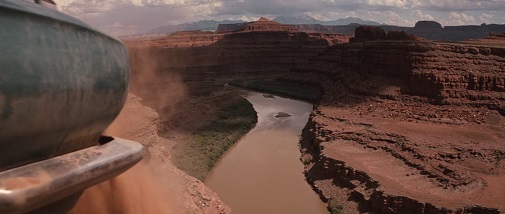
2:03:20 “Okay then, listen. Let’s not get caught.”
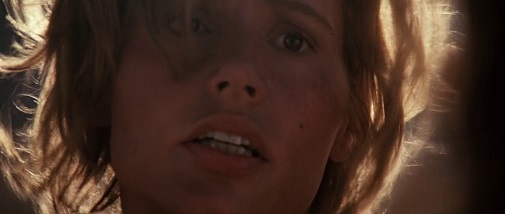
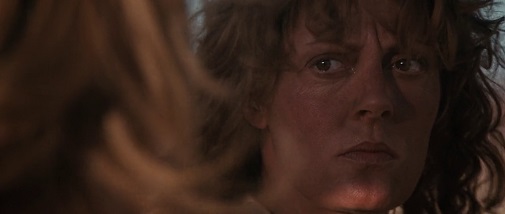
It’s truly testament to just how much this movie works that this scene, in which the two main characters agree to a spontaneous suicide pact, feels uplifting rather than horrifyingly bleak. At least some of that is the framing; they’re now essentially surrounded by what they’ve been trying desperately to escape. All they have is each other, because the rest of the world has never done anything for them. And then they kiss, without really having the time to unpack what that means for either of them. It’s just a pure expression of love; likely the purest either have ever felt for another person. You might say the way it's shot obscures the kiss itself maybe too deliberately, but at the same time, for the very first time in the movie it feels like we're intruding on a private moment between them.
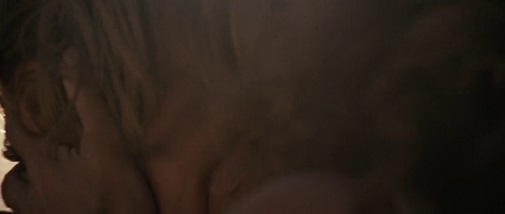
Slocumb’s presence makes little difference here; the way he runs after the car as Louise guns it is a moment that has never quite landed for me. While his investment makes sense, and his pleading to prevent the two women from coming to harm is valiant, through modern eyes it comes off as a bit nice guy-ish. Or perhaps he’s just emblematic of the kind of world these women didn’t really know they could have existed in.
Thom Noble edits this sequence so well. Each cut creates more drama than the last, such that even though it all happens so fast, it feels like an eternity that you’re watching that car soar over the Grand Canyon. The polaroid is whipped out of the back seat, their image living on the wind, and the hubcap flies off the Thunderbird, symbolic of the shackles of their domestic lives breaking off their ankles.
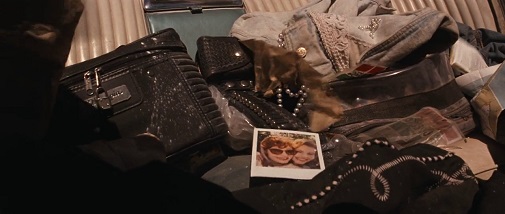
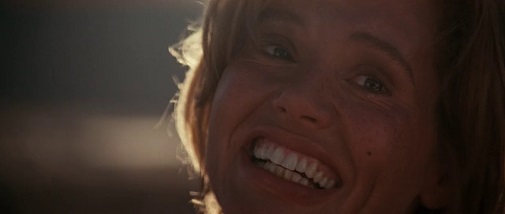
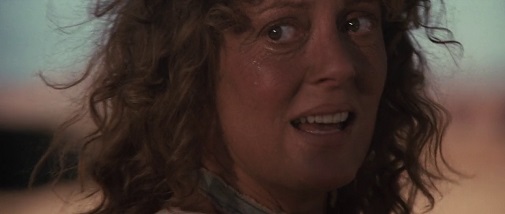
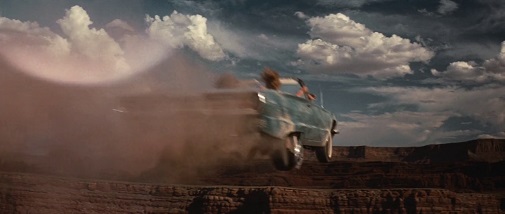
It’s a timeless image to end what remains a timely film, which looks and sounds gorgeous. It’s also a real crime that it wasn’t nominated for Costume Design, because the way their looks evolve throughout this film is unreal (kudos to Elizabeth McBride, whose lone nomination was for Driving Miss Daisy).
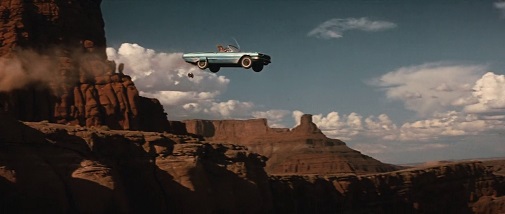
But it’s ultimately the Sarandon and Davis show, two women whose careers really have been so indelibly shaped by this movie and what it represents. Their performances are sexy, raw, vibrant, heart-rending, but they ring with such clarity, such realness. There’s so much that could be said about it, but really, there’s only one way to sum it up:
